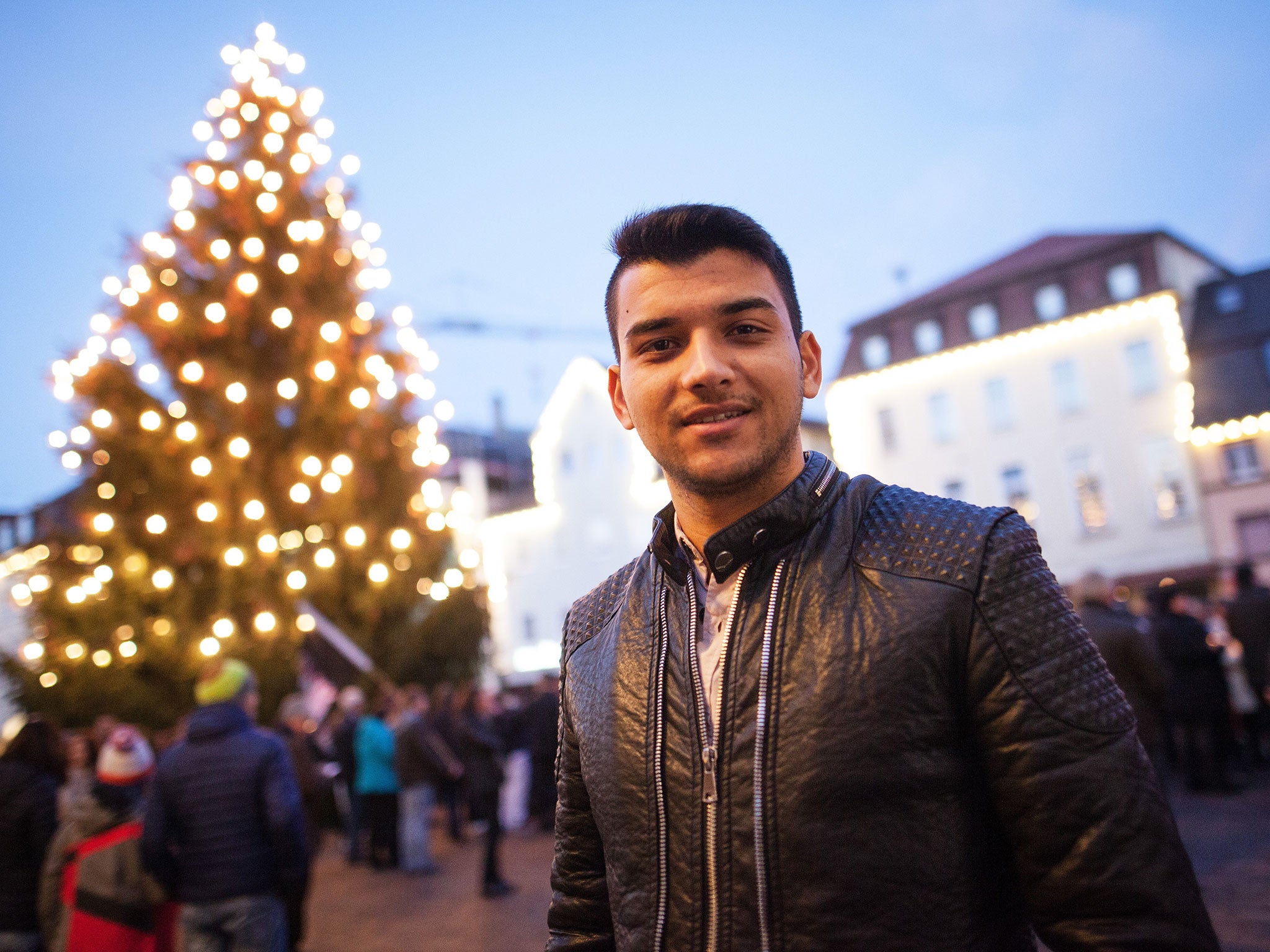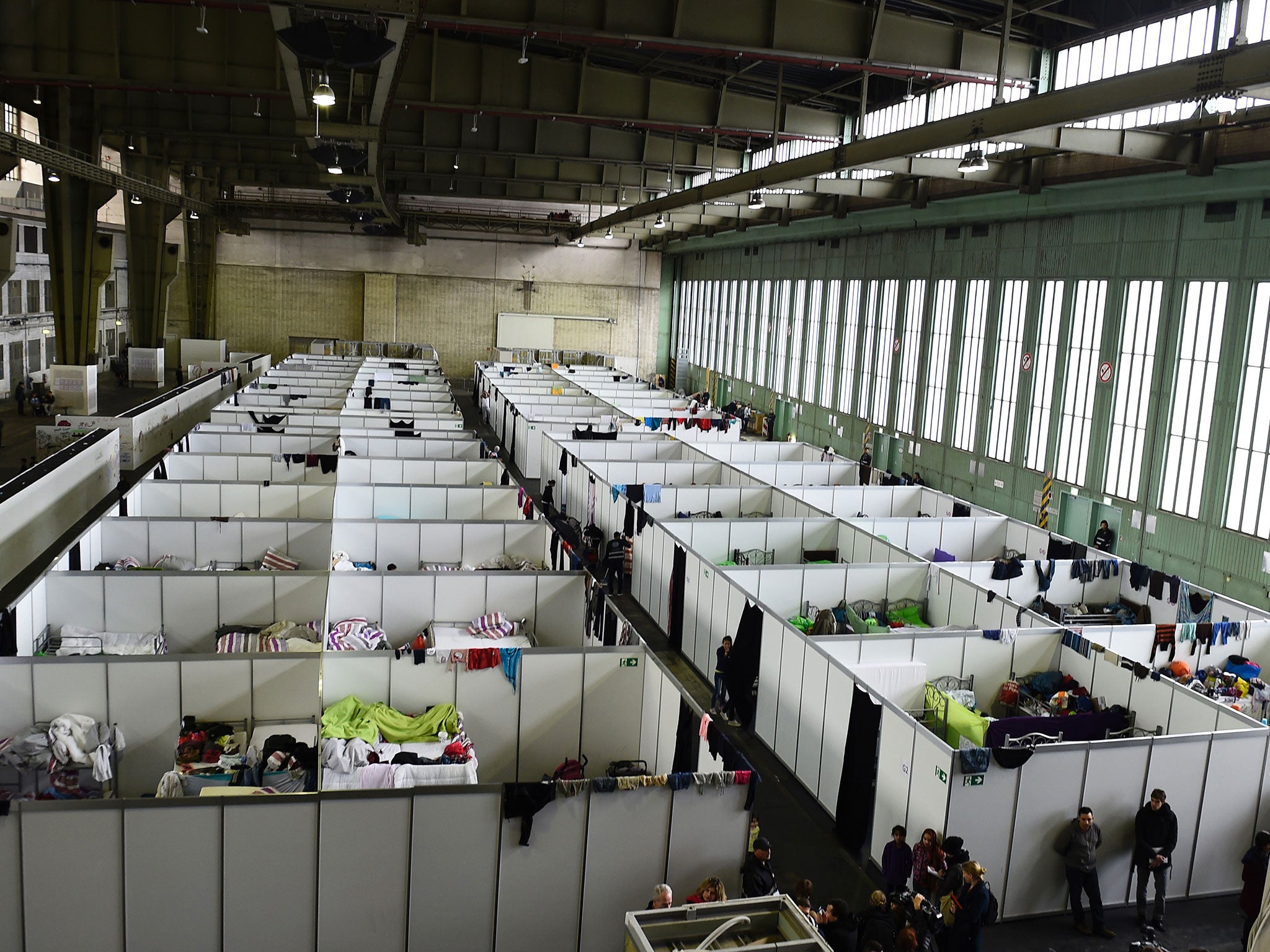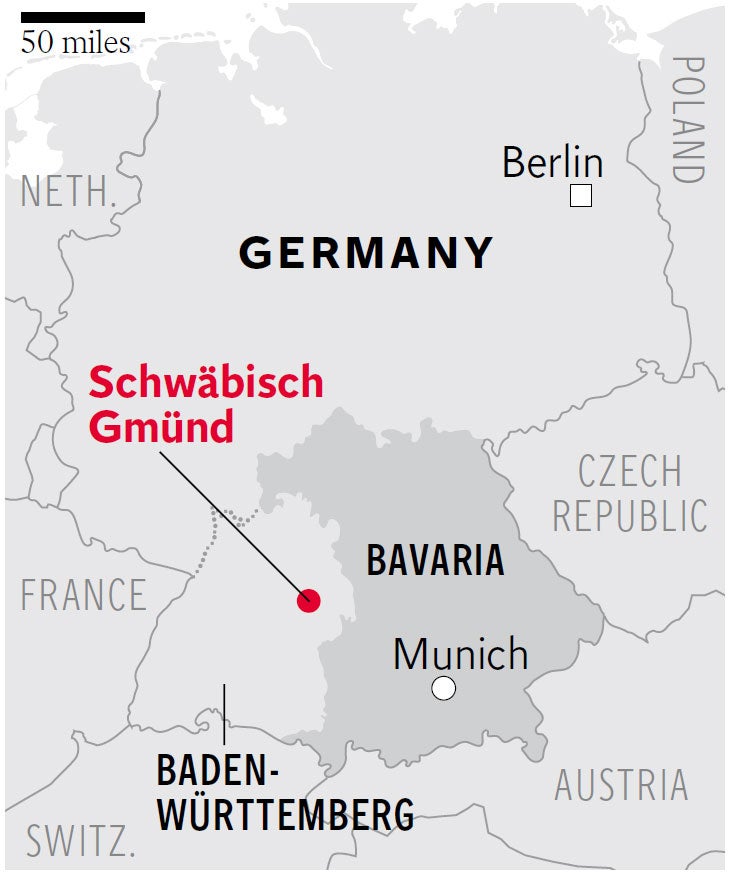Refugees in Germany: Arsonists destroy refugee hotel in 'model' migrant town Schwabisch Gmund
A citizen stands proudly in the centre of Germany’s ‘model’ migrant town. But a week before, arsonists tried to shatter this picture of civic harmony by burning down an asylum hostel. Tony Paterson reports from Schwäbisch Gmünd

The suspected arson attack on Germany’s “model“ migrant town could hardly have struck a more politically sensitive target.
Schwäbisch Gmünd, a Swabian provincial city of 60,000, is regarded as living proof of Chancellor Angela Merkel’s claim that Germans “can manage” Europe’s biggest refugee crisis since the Second World War.
But, on Christmas Eve, suspected far-right supporters set fire to a brand new, and as yet empty, architect-designed asylum hostel for 120 people in the south German town’s suburbs. Although no one was hurt, the attack rendered the building uninhabitable. Hopes that refugees could move into the complex in early 2016 were crushed.
The incident was just one of the more than 220 such suspected far-right attacks in 2015. But in Schwäbisch Gmünd it destroyed the notion that assimilation policies could somehow shield the town from violence. “It was incomprehensible – we have invested so much in integrating refugees and the policy is widely accepted,” said Klaus Pavel, a leading regional member of Ms Merkel’s conservatives.
More than 800 concerned citizens gathered around the Christmas tree on the town’s cobbled 18th-century main square to condemn the attack. Describing the incident as “cowardly” Schwäbisch Gmünd’s conservative mayor Richard Arnold proclaimed that his town was a “beacon of openness” which remained “opposed to stupidity and darkness”.
Mr Arnold has staked his reputation on his town’s handling of the refugee crisis. Since Chancellor Merkel introduced her controversial “open-door refugee” policy late in the summer of 2015, many German towns have seen an influx of refugees and migrants – with more than one million people, mainly from the war-torn Middle East, Afghanistan and sub-Saharan Africa, having arrived in the country. Most live in requisitioned sports halls, disused aircraft hangars, empty barracks or heated tents.
Not so in Schwäbisch Gmünd. Half of the town’s 800 refugees live in private households. Mr Arnold’s 80-year-old parents, who live in a shared community flat, have taken in two refugees from Africa. One is Nigerian the other is from Gambia. “They have brought a breath of fresh air into the place,” Mr Arnold insists. “Integration does not work if refugees live five to a room in a hostel, they have to get into private homes.”
Mr Arnold’s approach is known throughout Germany as the “Gmünder Weg” (the Gmünder Way). It aims to integrate refugees quickly by housing them in private accommodation or specially designed community flats. So far, 90 private flats and houses have been put at refugees’ disposal. Schwäbisch Gmünd’s tolerance may stem from the fact that its population grew by 30 per cent after 1945 thanks to the arrival of German refugees from Soviet-occupied eastern Europe.
All of today’s refugees and migrants are offered German language courses from the outset. Most of the teachers are voluntary workers. The new arrivals are encouraged to join community associations such as choirs, clubs and even to support the fire brigade.

Near the end of last month, Ramin, a 20-year-old refugee from Afghanistan, had been accepted for a job as a rescue worker; his friend, Rodriguez, from Cameroon, had been voted on to a church council.
“Those who join in, get involved, get school qualifications and an apprenticeship should be allowed to stay,” insists Mr Arnold. He believes that most refugees will be inclined to stay in Germany and the sooner they integrate, the better their prospects.
Yet not everything in Schwäbisch Gmünd reflects the town’s “model refugee” image. Recently, Bright, a 20-year-old refugee from Nigeria and his friend Ken were busy dragging a decaying bed and a decrepit armchair into their asylum hostel in a disused former US army barracks in the town’s outlying Hardt district. Inside, the building was filthy, the walls scrawled with graffiti, the kitchen covered in pools of water.

“The conditions here are disgusting,” said Bright, who had fled religious persecution and crossed the Mediterranean by boat to get to Europe. “When people in here take off their clothes to wash, you can see their bodies covered in rashes. We think it is because of the conditions here,” he told The Independent.
One of Bright’s hostel neighbours was a 37-year-old woman called Mercy. Also from Nigeria, the single mother said she had spent the past two years living and sleeping in one room in the former barracks with her three children. The eldest, a boy, was 10. “He has problems at school,” she said. “The people here don’t like blacks.”
Mercy said she was hoping that after two years’ wait she would eventually be granted asylum in Germany. She said she was attending German lessons and once joined in a city scheme for refugees to help landscape municipal gardens. “We got no money. I did it to make them happy. But blacks are not welcome here,” she insisted. It seemed that Bright, Ken and Mercy had not yet stepped on to the Gmünder Weg’s fast track to integration and success.
A 1950s housing estate separated their barrack hostel from the fire-damaged new asylum home that fell victim to the Christmas Eve attack. Outside one of the flats, a young German couple were unloading their post-festivity shopping from their VW.
“There are plenty of people around here who have problems with refugees,” they admitted, without giving their names. “We’ve got nothing against them personally but we don’t much like the idea of a new hostel parked right in front of our noses. They’ll be sending their kids to the local school next.”
Mayor Richard Arnold is an ardent supporter of Angela Merkel. But he is the first to admit that if the flow of refugees entering Germany continues at its present rate, his model migrant town will no longer be able to cope. The prospect, he says, makes his “stomach ache”.
Join our commenting forum
Join thought-provoking conversations, follow other Independent readers and see their replies
Comments